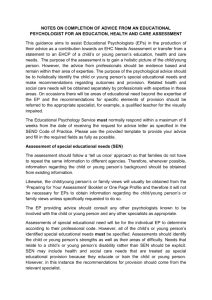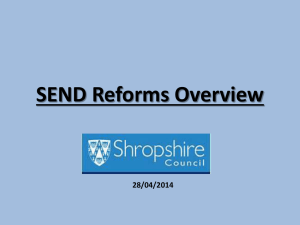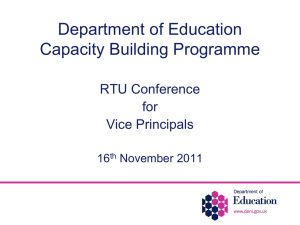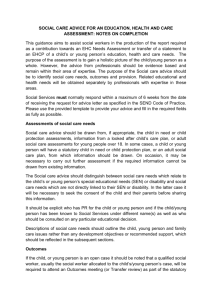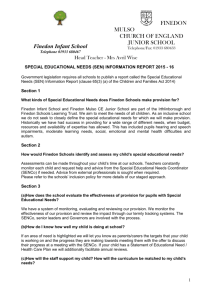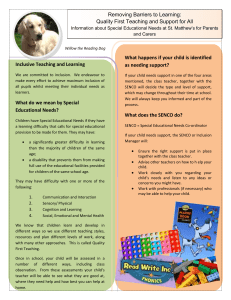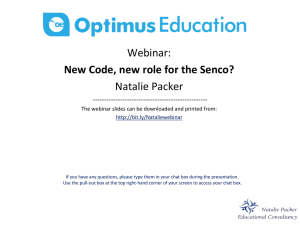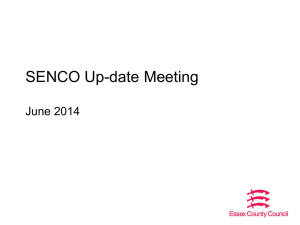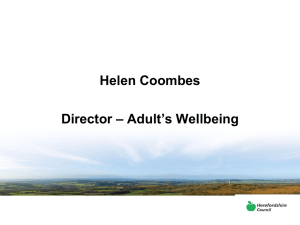PowerPoint version - St Francis Xavier`s RC Primary School
advertisement
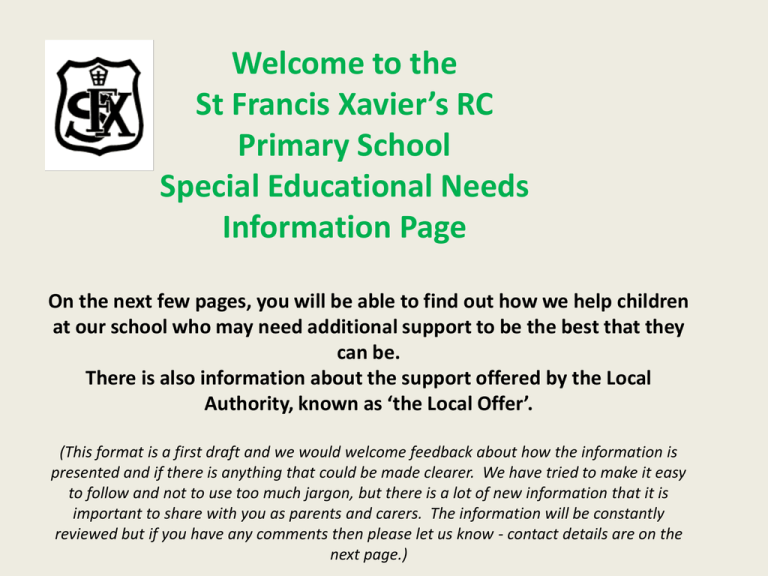
Welcome to the St Francis Xavier’s RC Primary School Special Educational Needs Information Page On the next few pages, you will be able to find out how we help children at our school who may need additional support to be the best that they can be. There is also information about the support offered by the Local Authority, known as ‘the Local Offer’. (This format is a first draft and we would welcome feedback about how the information is presented and if there is anything that could be made clearer. We have tried to make it easy to follow and not to use too much jargon, but there is a lot of new information that it is important to share with you as parents and carers. The information will be constantly reviewed but if you have any comments then please let us know - contact details are on the next page.) Contact Details Mrs C Darcy (Special Educational Needs Coordinator) Email: cdarcy@st-francisxaviers.hereford.sch.uk Mrs D Pearce - Head Teacher (for Behaviour / Pastoral concerns) Email: admin@st-francisxaviers.hereford.sch.uk School Telephone Number: (01432) 273941 The Local Offer - information for families on special educational needs and disabilities provided by Herefordshire Council About the Local Offer The Children and Families Act (2014) requires all local councils to set out a 'local offer' of the support available to assist children and young people, aged from birth to 25 years of age (and their families) who are disabled and/or have special educational needs. The local offer should include information about:1. Education, health and social care services from birth to 25 years of age 2. Eligibility criteria to access specialist support services 3. The support arrangements available to help you access the services you need 4. How to make a complaint The Local Offer is a one-stop-shop for parents, carers, family members and practitioners working with families to find the information they want about support and services for children with special educational needs and disabilities. Local Offer Link Click here to view the Herefordshire’s Local Offer A Graduated Response St Francis Xavier’s RC Primary School has adopted a graduated response to meet the needs of pupils with Special Educational Needs and/or Disabilities (SEND) which is in line with the policy of the Local Authority and the new Code of Practice (July 2014). The following four slides outline how the graduated response works in our school and what it means for you and your child. Stage 1 What will school do? Initially your child’s needs will be identified by the class teacher as part of the rigorous, whole-school monitoring cycle. If they are falling behind the level expected for children their age or they are not making the progress expected, appropriate provision will be made for them. How will you be involved? What will this mean for your child? This will be discussed with you at the earliest opportunity, either at parent consultation evenings or you may be asked to come into school for an additional meeting with your child’s class teacher. At this stage, your child may be offered additional support in the form of an intervention designed to accelerate progress for pupils who require a ‘boost’ in their learning. This should enable them to make progress towards expected outcomes. Not all children who take part in these interventions will be identified as having SEN at this stage. Stage 2 What will school do? If, following targeted support, your child has still not made sufficient progress, their class teacher will consult with the school’s Special Educational Needs Coordinator (SENCO). She will offer advice on how to support your child further and may carry out further assessments to identify any possible barriers to learning. How will you be involved? You will be given an opportunity to meet with the SENCO. This is a useful time to discuss any concerns you might have and to explore any further assessments that might be useful. If you agree to further assessments being carried out, you will be invited back at a later date to discuss the outcomes of these and how they might impact on future provision for your child. What will this mean for your child? If you have agreed to further assessments, these will be carried out as soon as possible. Information gathered about your child, including their views about their own learning, will be used to provide an individual learning plan for your child. This information may be recorded as part of the class profile/provision map or may be written as an individual provision map, depending on the level and type of need. Depending on the outcome of any assessments, with your permission, your child may be placed on the school’s list for children who are receiving SEN Support. Stage 3 What will school do? As part of the review process, when it is clear that specific support has been delivered but has still not resulted in your child making satisfactory progress to meet national expectations (or be on track to do so), the SENCO will consider making arrangements for a referral to an outside specialist to gather further information e.g. an educational psychologist. How will you be involved? What will this mean for your child? You will be invited to a meeting to review your child’s provision and progress. A referral to an outside agency will be discussed and, if it is agreed that this is the best course of action, you will be asked for your permission to allow the school to do this. You will usually be invited to meet with the member of the team who comes into school to work with your child. Your child will be assessed by the outside agency who will usually give the school a list of recommendations to follow. At this stage, these will be discussed with you and your child and will usually be written into an Individual Provision Map. Progress against specific targets will be reviewed frequently as part of the ‘assess- plan- do- review’ cycle. By this stage, children are usually placed on a list for children who receive SEN Support. Stage 4 What will school do? How will you be involved? What will this mean for your child? What happens when expert advice has been sought and followed with rigour, over a period of time, and still your child has made less than expected progress? In such cases consideration will be given to requesting an assessment for an Education, Health and Care plan (EHCP). Further details about EHCPs are given on the next page. You will have been involved in the ‘assessplan-do-review’ cycle since your child’s needs were identified by the class teacher. This stage is no different and you will be involved in every step of the process. Provision will still carry on while the assessment is made. Your child will be asked for their views in the same way that they have been involved in their own provision previously. Further assessments may need to be carried out for the Local Authority. Education, Health and Care Plans (EHCPs) Education, Health and Care Plans (EHCPs) are replacing Statements of Special Educational Needs over the next three years. ‘The purpose of an EHCP is to make special educational provision to meet the special educational needs of the child or young person, to secure the best possible outcomes for them across education, health and social care and, as they get older, prepare them for adulthood.’ SEN Code of Practice 2014 (9.2) An education, health and care needs assessment for a child or young person can be requested by:•the child’s parent •a young person over the age of 16 but under the age of 25 •a person acting on behalf of a school or post-16 institution (ideally with the knowledge and agreement of the parent or young person, where possible). Further advice can be sought from school, the Local Authority and the Special Educational Needs and Disabilities Information Advice and Support Service (SENDIAS). If you want to approach the Local Authority directly to make a request for an Education, Health and Care Plan, there is a link on the third page of this presentation. Alternatively, you can ring the SEN Team on: Telephone:01432 260869 Email: senteam@herefordshire.gov.uk You can find additional, impartial support and advice from the Herefordshire Special Educational Needs and Disabilities Information and Advice Service (SENDIAS) which was formerly known as the Parent Partnership Service. Telephone: 01432 260955 Email: parentpartnership@herefordshire.gov.uk The Code of Practice (2014) has identified four broad areas of need for schools to use to review and manage provision for children who require special educational provision, that is, in addition to the Quality First Teaching that all children will receive from their class teachers:1. 2. 3. 4. Communication and Interaction Cognition and Learning Social, emotional and mental health difficulties Sensory and/or physical needs The following pages describe some of the ways in which we might support each area… Communication and Interaction • Interventions from the Speech and Language Service • Implementation of their programmes by trained TAs • Use of ‘Black Sheep Press’ auditory memory materials • Communicate in Print (Symbols) to aid comprehension • Memory training programme • Talk Boost Programme • Teaching Talking Programme Staff trained in: Elklan Speech and Language Programme/ Talk Boost/Teaching Talking Outside agencies: Speech and Language Therapy Service (SALT), Educational Psychologist Cognition and Learning • Small guided group support by teacher/TA or SENCO. • Catch Up Literacy • Direct Phonics • RWI 1:1 Phonics Tutoring and Freshstart • Individualised one to one reading/writing sessions with the SENCO • Multi Sensory Learning Structured Literacy Programme • Catch Up Numeracy /Springboard Maths • Wave 3 Maths Intervention Staff trained in: OCR Certificate for Teachers of Learners with SpLD CCET (Certificate of Competence in Educational Testing – validated by the British Psychological Society) Catch Up Literacy and Numeracy Programmes Read Write Inc Outside agencies: Educational Psychologist Social, Emotional and Mental Health Difficulties • Use of school’s behaviour policy and PSHE policy • Social Skills Programme – Time to Talk/Socially Speaking • Home/school link book • 1:1 pastoral support programmes • Alternative curriculum provision, where necessary • 1:1 support, where appropriate, for personal care issues • ‘Start of day’ sessions to ease home/school transition • Designated TA at play time and lunchtime • Play Leaders at play time • Support for parents (Triple P parenting programme) Staff trained in: Positive Handling Training (Team Teach) Outside agencies: Educational Psychologist, Behaviour Team, Child and Adolescent Mental Health Service (CAMHS), Child Development Centre (CDC), School Counselling Sessions, School Nurse, Phoenix (Bereavement Service), Positive Parenting Groups Sensory and/or Physical Needs • 1:1 support sessions from the OT/Physio teams • Sessions planned by OT/Physio teams and delivered by TA • Motor Skills group sessions – using Motor Skills United and Pindora’s Box resources • Specialist equipment – wedges, desk slopes, pencil grips etc • Soundfield system (in some classrooms) • Visual support materials (Braille machine, visualiser etc) on loan from the support services • Ipad – to support learning for those with physical difficulties Staff trained in: The use of Braille with visually impaired learners Outside agencies: Child Development Centre (CDC) The Kite Centre – Occupational Therapy and Physiotherapy Teams Inclusion support (Blackmarston School) Specialist Advisory Teachers Equipment specialists – to advise on and adjust specialist equipment
